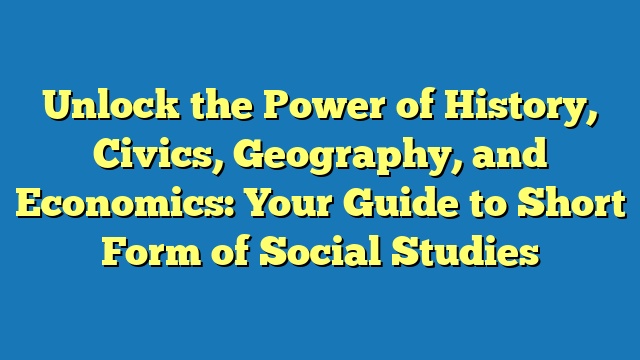The term “short form of social studies” refers to a condensed version of the academic discipline encompassing the study of human society. It provides a comprehensive understanding of history, geography, economics, and civics in a consolidated format.
Social studies in this form is highly relevant to students who seek to gain a holistic perspective on the world around them. Its benefits include improved critical thinking skills, enhanced civic awareness, and a deeper understanding of the human condition. Historically, the development of interdisciplinary approaches like social studies has been instrumental in promoting a more well-rounded education.
This article will delve into the various aspects of the short form of social studies, exploring its educational value, teaching methodologies, and its significance in shaping future generations of informed citizens.
short form of social studies
Understanding the essential aspects of the short form of social studies is crucial for appreciating its educational value and impact. These aspects encompass the core components, teaching methodologies, and historical development that shape this condensed version of the discipline.
- Condensed format: Combines history, geography, economics, and civics into a single subject.
- Holistic perspective: Provides a comprehensive understanding of human society and its interactions.
- Critical thinking: Encourages students to analyze, evaluate, and interpret social issues.
- Civic awareness: Fosters an understanding of rights, responsibilities, and the importance of active citizenship.
- Historical context: Examines past events and their influence on present-day society.
- Interdisciplinary approach: Draws connections between different social science disciplines.
- Inquiry-based learning: Encourages students to ask questions, research, and form their own conclusions.
- Project-based learning: Provides opportunities for students to apply their knowledge through hands-on projects.
- Technology integration: Utilizes technology to enhance learning and engagement.
- Assessment: Employs various assessment methods to evaluate student progress and understanding.
These aspects, when combined, create a dynamic and engaging learning experience that equips students with the knowledge, skills, and values necessary to navigate the complexities of the modern world. By understanding these essential elements, educators and policymakers can effectively implement and refine the short form of social studies to meet the needs of future generations.
Condensed format
The condensed format of social studies integrates various disciplines, such as history, geography, economics, and civics, into a cohesive whole. This approach offers several advantages, including a comprehensive understanding of human society and its interactions.
- Historical Context: Explores past events and their influence on present-day society, providing a deeper understanding of the roots of current issues.
- Geographic Perspectives: Examines the relationship between human societies and their physical environment, fostering an appreciation for the impact of geography on cultural development.
- Economic Systems: Analyzes different economic systems and their impact on societies, equipping students with the knowledge to understand complex economic issues.
- Civic Responsibilities: Emphasizes the rights and responsibilities of citizens, promoting active participation in society and an understanding of democratic principles.
By combining these diverse perspectives, the condensed format of social studies provides students with a well-rounded education that prepares them to engage critically with the world around them. It fosters an understanding of the interconnectedness of human societies and the complexities of social issues, empowering them to make informed decisions as responsible citizens.
Holistic perspective
The holistic perspective is a defining characteristic of the short form of social studies. It emphasizes the interconnectedness of human societies and the need to understand them in their entirety. This perspective is critical because it allows students to grasp the complex relationships between different aspects of society, such as history, geography, economics, and civics.
Real-life examples of the holistic perspective in action can be found in many social studies classrooms. For instance, students may study the history of the American Civil War and its impact on the nation’s geography, economy, and political system. By examining these connections, students gain a more profound understanding of the war’s causes and consequences.
The practical applications of this understanding are vast. Individuals with a holistic perspective are better equipped to navigate the complexities of modern society. They can understand the historical roots of current events, appreciate the diverse perspectives of different cultures, and make informed decisions about social and political issues.
In conclusion, the holistic perspective is a vital component of the short form of social studies. It provides students with a comprehensive understanding of human society and its interactions, empowering them to become informed and engaged citizens.
Critical thinking
Within the framework of short form of social studies, critical thinking plays a crucial role in enabling students to navigate the complexities of social issues. It empowers them to analyze, evaluate, and interpret information, forming well-informed opinions and making sound decisions.
- Examining Multiple Perspectives: Encourages students to consider different viewpoints and perspectives, fostering an understanding of diverse opinions and experiences.
- Evaluating Evidence: Equips students with the skills to assess the credibility and relevance of information, enabling them to distinguish facts from opinions and biases.
- Identifying Assumptions: Trains students to recognize and challenge assumptions that underlie arguments, promoting a more nuanced and critical approach to social issues.
- Formulating Conclusions: Guides students in developing logical and evidence-based conclusions, empowering them to communicate their thoughts and ideas effectively.
By fostering these critical thinking skills, short form of social studies empowers students to actively engage with social issues, promoting informed citizenship and preparing them to make a positive impact on society. It equips them with the tools to navigate the complexities of the modern world, enabling them to analyze, evaluate, and interpret information critically.
Civic awareness
Civic awareness is a cornerstone of the short form of social studies, emphasizing the rights, responsibilities, and importance of active citizenship. This component of social studies education instills in students a profound understanding of their roles and responsibilities within society, empowering them to participate fully and contribute positively to their communities.
Real-life examples abound in short form of social studies classrooms. Students may engage in mock elections, simulate legislative debates, or volunteer in local organizations. These experiences provide tangible opportunities to develop civic awareness and foster a sense of responsibility towards their communities.
The practical applications of civic awareness extend far beyond the classroom. Individuals with a strong sense of civic awareness are more likely to vote, participate in community activities, and advocate for social justice. They recognize the importance of an informed citizenry and actively engage in shaping the future of their communities and the nation.
In summary, civic awareness is a vital element of the short form of social studies. It equips students with the knowledge, skills, and values necessary to become active and responsible citizens, empowering them to make informed decisions and contribute meaningfully to society.
Historical context
Historical context, as a crucial component of the short form of social studies, provides a lens through which students can comprehend the intricate connections between past events and their enduring impact on contemporary society. By examining historical occurrences, students gain invaluable insights into the forces that have shaped the world around them and develop a deeper understanding of current social, political, and economic issues.
Real-life examples of historical context within the short form of social studies abound. Students may delve into the historical roots of modern-day inequalities, tracing their origins back to historical events and policies. Through case studies and simulations, they can explore how past decisions have shaped present-day institutions and social structures.
The practical applications of understanding historical context extend far beyond the classroom. Individuals equipped with a strong grasp of history are better able to comprehend current events, make informed decisions, and actively participate in shaping the future. By recognizing the historical underpinnings of contemporary issues, they can avoid repeating past mistakes and work towards creating a more just and equitable society.
In summary, historical context plays a vital role in the short form of social studies, enabling students to develop a comprehensive understanding of society and its evolution. Through the examination of past events, students gain valuable insights into the causes and consequences of social phenomena, fostering informed citizenship and empowering them to make a positive impact on the world.
Interdisciplinary approach
Within the realm of social studies, the interdisciplinary approach stands as a cornerstone of the short form of social studies, serving as a catalyst for deeper understanding and comprehensive analysis of societal issues. This approach transcends the boundaries of individual disciplines, fostering connections between history, geography, economics, and civics, to provide a holistic perspective on the human experience.
Real-life examples of this interdisciplinary approach abound within the short form of social studies. Students may engage in projects that examine the historical roots of economic inequality, exploring the interplay between political decisions, social structures, and economic outcomes. By examining these connections, students gain a more nuanced understanding of complex social phenomena.
The practical applications of this interdisciplinary approach extend far beyond the classroom. Individuals equipped with this understanding are better able to navigate the complexities of modern society, where issues rarely fall neatly within the confines of a single discipline. They can analyze problems from multiple perspectives, identify interdependencies, and develop more effective solutions.
In summary, the interdisciplinary approach is a defining characteristic of the short form of social studies. It empowers students to develop a comprehensive understanding of society, recognize the interconnectedness of social phenomena, and make informed decisions as responsible citizens.
Inquiry-based learning
Within the context of the short form of social studies, inquiry-based learning serves as a cornerstone, fostering critical thinking and empowering students to actively engage with the subject matter. This approach places students at the center of the learning process, encouraging them to question, investigate, and construct their own understandings of social phenomena.
Inquiry-based learning is a critical component of the short form of social studies as it aligns seamlessly with its interdisciplinary nature. By encouraging students to explore multiple perspectives and disciplines, inquiry-based learning helps them develop a more comprehensive understanding of the complex interactions that shape society.
Real-life examples of inquiry-based learning within the short form of social studies abound. Students may engage in projects that examine the historical roots of modern-day inequalities, analyzing primary and secondary sources to form their own conclusions. Through these investigations, they develop valuable research skills and learn to think critically about social issues.
The practical applications of inquiry-based learning extend far beyond the classroom. Individuals equipped with these skills are better able to navigate the complexities of modern society, where information is readily available but not always reliable. They can critically evaluate information, form their own informed opinions, and make responsible decisions.
In summary, inquiry-based learning is an essential component of the short form of social studies, fostering critical thinking, promoting interdisciplinary understanding, and empowering students to become active and informed citizens.
Project-based learning
Within the context of short form of social studies, project-based learning plays a vital role as a pedagogical approach that bridges theory and practice. By engaging in hands-on projects, students have the opportunity to delve deeper into social studies concepts and apply their knowledge to real-world scenarios.
- Experiential Learning: Project-based learning fosters experiential learning, enabling students to actively participate in the learning process and retain knowledge more effectively.
- Collaboration and Communication: Projects often involve group work, promoting collaboration and communication skills as students work together to achieve shared goals.
- Critical Thinking and Problem-Solving: Projects encourage critical thinking as students analyze problems, develop solutions, and evaluate outcomes.
- Real-World Applications: By working on projects that address real-world issues, students connect social studies concepts to their own lives and communities.
Project-based learning not only enhances students’ understanding of social studies but also cultivates valuable skills that are essential for success beyond the classroom. Students learn to collaborate effectively, think critically, solve problems creatively, and communicate their ideas clearly. These skills are highly sought after in various fields, preparing students for future success in higher education, careers, and civic engagement.
Technology integration
Within the context of short form of social studies, technology integration plays a crucial role in enhancing student learning and engagement. By leveraging technological tools and resources, educators can make social studies more interactive, accessible, and relevant to students, fostering a deeper understanding of the subject matter.
- Interactive Learning Platforms: Online platforms and simulations provide students with immersive and interactive learning experiences, allowing them to explore historical events, conduct virtual experiments, and engage in collaborative projects.
- Digital Primary Sources: Technology grants access to a vast repository of digitized primary sources, such as historical documents, photographs, and artifacts, enabling students to engage with historical evidence firsthand.
- Gamification and Educational Games: Gamification techniques and educational games make learning fun and engaging, fostering a competitive spirit and motivating students to actively participate.
- Virtual Field Trips and Simulations: Through virtual reality (VR) and augmented reality (AR) technologies, students can embark on virtual field trips and simulations, experiencing historical sites and events in an immersive and interactive manner.
Technology integration in short form of social studies not only enhances the learning experience but also prepares students for the digital world they will encounter beyond the classroom. By equipping students with technological literacy and the ability to navigate and utilize digital resources, educators empower them to become informed and engaged citizens in the 21st century.
Assessment
Within the framework of short form of social studies, assessment plays a pivotal role in evaluating student learning and understanding. It encompasses a range of methods that enable educators to measure student progress, identify areas for improvement, and provide tailored support.
- Formative Assessments: Conducted throughout the learning process, these assessments provide regular feedback to students, allowing them to gauge their understanding and make necessary adjustments.
- Summative Assessments: Administered at the end of a unit or course, these assessments evaluate students’ overall knowledge and skills, providing a comprehensive measure of their learning outcomes.
- Performance-Based Assessments: Require students to demonstrate their understanding through hands-on tasks, projects, or presentations, fostering critical thinking and problem-solving skills.
- Technology-Enhanced Assessments: Utilize digital tools and platforms to conduct assessments, offering interactive and engaging experiences that cater to diverse learning styles.
The implementation of diverse assessment methods in short form of social studies aligns with the interdisciplinary nature of the subject, allowing educators to assess students’ understanding of historical events, geographical concepts, economic principles, and civic values. By providing ongoing feedback, identifying strengths and weaknesses, and encouraging student self-reflection, assessment contributes to the effectiveness of short form of social studies in preparing students for success in higher education, careers, and civic participation.
FAQs on Short Form of Social Studies
This section addresses frequently asked questions and clarifies key aspects of the short form of social studies to enhance understanding and address common misconceptions.
Question 1: What is the short form of social studies?
Answer: The short form of social studies refers to a condensed version of the academic discipline that combines history, geography, economics, and civics into a single subject.
Question 2: What are the benefits of studying short form of social studies?
Answer: Short form of social studies provides a comprehensive understanding of human society, fosters critical thinking skills, promotes civic awareness, and enhances students’ understanding of the historical context that shapes current events.
Question 3: How does short form of social studies differ from traditional social studies?
Answer: Traditional social studies typically treats each discipline separately, while the short form integrates them, allowing students to examine the interconnectedness of social phenomena.
Question 4: What teaching methodologies are used in short form of social studies?
Answer: Short form of social studies employs various teaching methodologies, including inquiry-based learning, project-based learning, technology integration, and diverse assessment methods.
Question 5: How is short form of social studies assessed?
Answer: Assessment in short form of social studies includes formative and summative assessments, performance-based tasks, and technology-enhanced methods to evaluate students’ understanding and skills.
Question 6: What are the career and educational opportunities for students who study short form of social studies?
Answer: Short form of social studies prepares students for careers in fields such as education, law, journalism, public service, and research. It also provides a strong foundation for further studies in social sciences and humanities.
These FAQs provide a concise overview of the key aspects of short form of social studies. They clarify its benefits, teaching methods, assessment techniques, and career prospects, equipping readers with a deeper understanding of this important subject.
In the following section, we will delve into the historical development of short form of social studies, exploring its evolution and the factors that have shaped its current form.
Tips for Teaching Short Form of Social Studies
This section provides practical tips to enhance the teaching and learning of short form of social studies. By implementing these strategies, educators can foster a dynamic and engaging learning environment that promotes student success.
Tip 1: Integrate Interdisciplinary Approaches: Connect concepts from history, geography, economics, and civics to provide a comprehensive understanding of social phenomena.
Tip 2: Utilize Inquiry-Based Learning: Engage students in asking questions, conducting research, and forming their own conclusions, fostering critical thinking and problem-solving skills.
Tip 3: Incorporate Project-Based Learning: Design projects that allow students to apply their knowledge to real-world scenarios, promoting collaboration and enhancing understanding.
Tip 4: Leverage Technology: Utilize interactive learning platforms, digital primary sources, and simulations to enhance engagement, accessibility, and digital literacy.
Tip 5: Employ Diverse Assessment Methods: Use formative and summative assessments, performance-based tasks, and technology-enhanced methods to evaluate student progress and provide timely feedback.
Summary: These tips empower educators to create a dynamic and effective short form of social studies learning experience. By fostering interdisciplinary connections, encouraging inquiry, and utilizing technology, students develop a deeper understanding of social issues and become informed and engaged citizens.
These tips lay the foundation for the final section of this article, which will examine the significance of short form of social studies in shaping future generations of informed and responsible citizens.
Conclusion
The exploration of “short form of social studies” throughout this article has shed light on its significance in shaping future generations of informed and responsible citizens. Key ideas and findings include the interdisciplinary approach, fostering critical thinking skills, promoting civic awareness, and leveraging technology to enhance learning. These elements are interconnected and contribute to a comprehensive understanding of human society and its complexities.
As we look towards the future, the role of short form of social studies becomes even more critical. In an increasingly interconnected and rapidly changing world, it is essential to equip students with the knowledge, skills, and values necessary to actively engage with social issues, make informed decisions, and contribute meaningfully to their communities. By embracing the transformative power of short form of social studies, we empower the next generation to navigate the challenges and opportunities of the 21st century and beyond.









Tips for Using "Template by Kevin Crafts" Comments for Meaningful Online Discussions